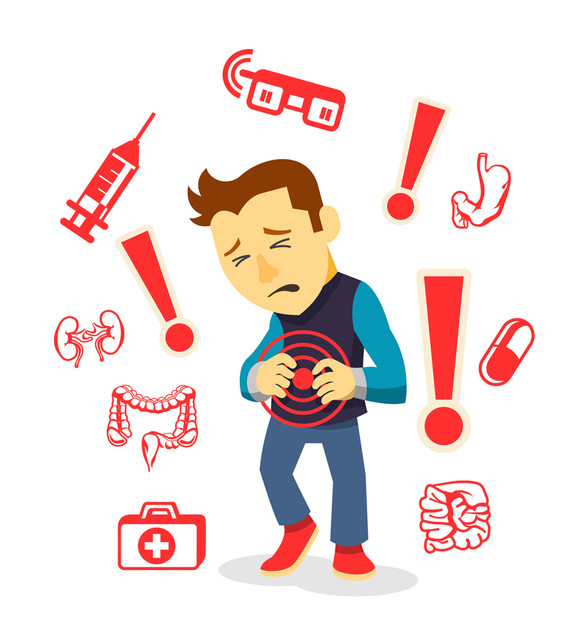Posted by -Beyond Health on Nov 3rd 2025
A New Answer to Problems with Your Intestines
Could SIBO Be Behind Your Digestive Symptoms?
Are you bothered by abdominal bloating, gas, flatulence, belching, or an irritable bowel—constipation alternating with diarrhea, or perhaps predominantly one or the other?
If so, you may be dealing with small intestinal bacterial overgrowth (SIBO), a now well-recognized but still frequently overlooked form of intestinal dysbiosis.
What Is SIBO?
You may already be familiar with one form of dysbiosis, in which yeast (such as Candida) or harmful bacteria overgrow in the intestines and crowd out beneficial organisms.
SIBO is different.
SIBO occurs specifically in the small intestine—the approximately 20-foot-long, tightly coiled digestive tube that connects the stomach to the colon. Under healthy conditions, the small intestine contains relatively few bacteria compared to the colon. When bacteria or other microorganisms that normally reside there begin to proliferate excessively, a pathological imbalance develops.
This overgrowth interferes with digestion and absorption and commonly leads to symptoms such as:
-
Bloating and abdominal distension
-
Gas, flatulence, and belching
-
Nausea
-
Constipation, diarrhea, or alternating patterns
-
Irritable bowel–type symptoms
Because the small intestine is where most nutrient absorption occurs, SIBO can also cause malabsorption and nutrient deficiencies, including:
-
Iron
-
Vitamin B12
-
Fat-soluble vitamins (A, D, E, and K)
Symptoms Beyond the Gut
SIBO doesn’t always confine itself to digestive discomfort. Research and clinical observation suggest it may contribute to problems outside the gastrointestinal tract, including:
-
Gastroesophageal reflux (GERD)
-
Headaches
-
Fatigue
-
Joint and muscle pain (SIBO is common in people with fibromyalgia)
-
Certain skin conditions
For some individuals, SIBO may be a hidden contributor to chronic, unexplained symptoms.
Clues That Point Toward SIBO
You may want to explore SIBO further if you notice patterns such as:
-
Temporary symptom relief with antibiotics (herbal or prescription), followed by relapse
-
Worsening symptoms with prebiotics or high-fiber foods
-
Low iron levels with no obvious cause
Importantly, stool tests are not useful for diagnosing SIBO, because the problem exists in the small intestine—not the colon.
How SIBO Is Diagnosed
SIBO is typically identified using a breath test. When bacteria overgrow in the small intestine, they ferment carbohydrates and produce gases that are absorbed into the bloodstream and exhaled in the breath.
-
Certain bacteria produce hydrogen or hydrogen sulfide
-
A microorganism called Methanobrevibacter smithii produces methane
Measuring these gases over time provides insight into the presence and type of SIBO.
Treatment and Long-Term Management
Treating SIBO can be complex and is best done with the guidance of a knowledgeable healthcare practitioner. A typical approach may include:
-
Dietary modification
A diet low in specific fermentable carbohydrates (often reducing grains and starchy vegetables) to deprive overgrown microbes of fuel. -
Targeted antimicrobial support
This may involve pharmaceutical or herbal antimicrobials. Berberine is one plant compound commonly used in this context. -
Healing and prevention after eradication
Once breath testing confirms resolution, the focus shifts to preventing relapse by:-
Continuing appropriate dietary strategies
-
Supporting intestinal healing
-
Replenishing nutrients
-
Using probiotics (but generally avoiding prebiotics initially)
-
What About Probiotics?
It may seem counterintuitive to use probiotics when the goal is to reduce bacterial overgrowth. However, both limited clinical studies and extensive practitioner experience suggest that specific, high-quality probiotics can be helpful in SIBO management and relapse prevention.
Anecdotal and clinical experience support the use of a potent, carefully selected formula such as Beyond Health’s Probiotic Formula once appropriate antimicrobial treatment is underway or completed.
A Potential Turning Point
For individuals who have struggled for years with irritable bowel syndrome or chronic digestive distress, proper diagnosis and treatment of SIBO can be life-changing.
If your symptoms haven’t responded to standard approaches, it may be time to look deeper—and consider whether SIBO is part of the picture.
 Fuel your life with the purest vitamins
Fuel your life with the purest vitamins
